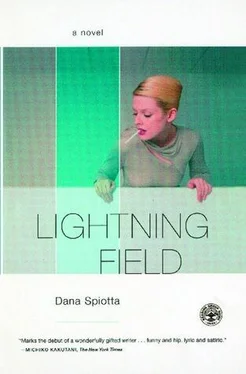Ordinary.
She liked, on these strolls from Max’s, to dream up the most painful, most dread-inspiring phrase and try it out on her psyche.
Her father would never forgive her for being ordinary.
Pretty good. Something she might tell a therapist. If she had one. But no one had one anymore. People had prescriptions, which were much less time-consuming. Precisely because no one bothered with it, therapy appealed to Mina. Therapy. It had an old-fashioned, retro charm to it. She fantasized about it, her perfect audience of one, her pad-scribbling, attentive psychotherapist. Eyes full of dewy sympathy. The sympathetic nods. Brow-furrowed and lip-pursed listening to Mina’s self-theories. The best phrases were just south of being true. And when she thought them, she felt she was shaking out blankets and pulling back curtains or stepping onto a scale. When she spoke them aloud, she became convinced they were dead-on, red-hot, epiphanic, life-changing revelations. Which was the problem, really. Assertions, of course, take on their own lives.
She would never forgive her father for being ordinary.
Pretty good. This is also what she knew about the confidence men. She could be one, too.
Mina passed the south edge of the expanded cemetery near Fountain. The cemetery was getting bigger all the time. In the future of Los Angeles, it would be just the fake adobe stores and the cemeteries. It was nearly seven. She had to finish this tour now.
Mina used to tell strangers about her father’s death.
The extraordinary death of an extraordinary man, Jack Delano. The pills, barbiturates, and the drink, Jack Daniel’s. The rope — a vintage sound cord, double knotted. Sometimes it was a shotgun in front of the photo of a smirking twenty-five-year-old Orson Welles. Wistfully she would add, what became of that photo — she wished someone, one of them, still had it. Nastier, the terry-cloth robe tossed aside, the final Pacific swim.People always believed what ridiculous stories she told of his death. Mina could drive these fears into sentences and then move onward, a veneer of calm. There were, in the weave the present made with the remembered past, telltale signs, warnings and intimations to be read, evident to the merest self-contemplation. And in the fleeting seconds before Mina’s hand actually hit her forehead to rid herself, actually jar herself, of too intense a contemplation of regret and reproach, fissures of other possibilities engulfed her, the landscape of her alternative, other life glimpsed. She thought of a parallel universe, similar but smarter, mocking her in this one.
Perhaps because she worked in a restaurant, or maybe because of her own food obsessions, when the dinner hour came around, and she glimpsed kitchens through windows and heard loose segments of family dialogue, at once strange and familiar, she found she couldn’t resist thought runs of them all. She first thought of him. Her brother. And Jack, her father. And even everyday David, husband of three years, through the pink dusk-lit window.
She imagined her brother eating something institutional and monotextured, perhaps laced with his resisted psychotropics, or at least an undertaste of hospital. Michael was in Alcatraz gray and grainy black-and-white, eating in mechanical gulps — although she’d never actually seen him eat that way, she couldn’t help imagining it now. And for symmetry’s sake, she tried to imagine a quick cut to Jack, the repressed fat barely kept at bay with diligent counting of caloric values, everything he ate meticulously low-fat and macrobiotic. Bragged about sourdough bread from two-hundred-year-old starter, perhaps Indian-touched in some way. Her husband, David, was of course strictly cardboard and plastic, the foodalready congealing on arrival. There was something so sad to her about eating alone, and something particularly unbearable about men eating alone. Maybe because only women actually preferred to eat alone, while such solitude made men vulnerable. Then Mina stopped, just shook her head slightly. It had become easier than she would have thought, this not thinking. Lately, her afternoons at Max’s fixed that for her.
In another lightning edit—
Max’s jean-clad thigh pressed between her legs. Or just him saying yes in the lowest of voices in her ear. Just thinking about it made her press her thighs together as she walked, made her careless and even smile to herself. Something there, in his gaze as she moved on the bed. The way she felt it even with her eyes closed. Being watched. She could close her eyes now and feel it, an intoxicating glow of attention not so far off from how the world looked with her eyes closed, warm darkness somehow shot through with sunlight, somehow seeing by feeling, probability shot through with suspense and memory and a tiny bit of faith, even.
Past the cemetery, Gower lost its interest, and Mina could have moved more quickly, could have felt urgency, should have, but she refused.
The afternoon’s tiny gestures, the taste of his fingertips, the seconds when they finished their drinks and his breathing changed, and she walked accordingly, meanderingly, kicking at gravel and feeling the edges of her shoes drag on the seams of the sidewalks. She looked at her feet as she walked — see the girl kick at the pavement. See her swing her arms.
When Mina had finally walked up the stone path to her house, she stopped at the point where she could look into David’s office. His computer was on, as it almost alwaysseemed to be. She stood there, as she had last night and the night before. It seemed she always ended up needing a bit more time, and the odd waiting and looking had become habit, even inevitable. She could spend her life in segues, commercial breaks, cigarette pauses, walks from, hallways to. She felt most herself hesitating before doorways and listening to the dial tone on her phone as she mustered the energy to call, or to hang up. These sideways, solitary moments when she could catch the world from the margins or at a glance. At the seams of things, or the awkward lulls the editor would leave out. She was convinced the truth of things could be glimpsed in these off-sides and in-between places. It was just these sorts of telling nonmoments that are most noticeably lacking in affairs. The incidentals that happen to couples when they move from one ordinary thing to the next, revealing the intimate ways people negotiate the world — pouring cereal, or addressing a letter, or the shape their mouth takes when they are on the phone with Mom. And any attempts to introduce them with Max seemed unbearably intrusive, a breach, a kind of rudeness. What’s worse, she’d begun longing for them. An almost insatiable curiosity and desire for boring quotidian details of Max’s life. She’d become even reluctant to leave him afterward, the horrible telltale thing — wanting to linger. She wanted to elongate her late afternoons at Max’s, stay in bed until they felt nearly stuck together, until they spoke and revealed odd things to each other, stick around until a meal was suggested, or a back rub, or a bath — anything but separating and that lump of afternoon light that hit her when he closed the door behind her. Today she had stayed in the lull, couldn’t help it, but in fact — and she knew this — the lingering and elongating tended to make things only sadder and weirder.
He complained of an arm falling asleep. Not complained, but said, “Honey, can I just shift my arm, can we just. . yeah, much better,” but it was not just repositioning, it was incremental separating. First it was the arm out from under her, then he had to go to the bathroom. Then she heard him pee. Next the move to the shower, and it was his not-so-subtle signal that the cuddle, bed part of their afternoon was over. And if Mina defiantly stayed in bed throughout the shower, as she had today, if she remained warm and quiet until he came out in a towel, he would act as though it did not bother him, in fact he would appear pathologically unbothered, severely without bother, and this would bother her and she would tell him to come here, as though she was longing to touch him, but it was really a battle of wills at this point, a war of trite longings.
Читать дальше












